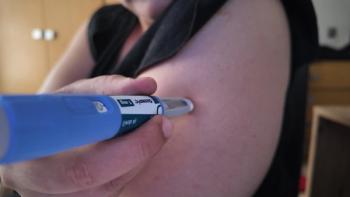
Battle Weary: When Discussing Cancer, Military Terminology Doesn't Help
The use of military metaphors when discussing cancer and patients with the disease could be negatively affecting the patients, their outlook and their coping abilities.
Carla Remondini, MSN, RN, AGCNS-BC, OCN, RN-BC
Military symbolism is widely used in discussing cancer. Promotions for cancer centers or fundraisers, as well as conversations between patients and their healthcare providers or loved ones, often focus on the idea of fighting, or battling, cancer.
But how do these military metaphors, as opposed to the commonly used phrase “cancer journey,” affect the outlook and coping ability of patients? And what do they accomplish when it comes to motivating those without cancer to engage in preventive measures?
Carla Remondini, MSN, RN, AGCNS-BC, OCN, RN-BC, of Scripps Mercy Hospital, in San Diego, researched the issue to provide guidance to oncology nurses about how best to communicate with their patients. She learned that military language, for the most part, has a negative effect, both on the emotional state of patients and on the level of engagement of others with preventive efforts.
This finding fits with general expert opinion in the oncology arena, which favors journey metaphors, Remondini said. And although the response to military wording can vary from patient to patient, she said the findings suggest that America needs to reframe the language it uses in its public discourse about cancer.
Remondini presented her findings in a poster and discussion at the 42nd ONS Annual Congress held May 4-7 in Denver. Her report was based on an analysis of peer-reviewed articles about the psychosocial impact of military and journey metaphors on patients with cancer during the period 2000 to 2016. Of 116 studies Remfondini found, she deemed 13 of them relevant, 4 of those conducted in large patient populations.
She embarked on the project because her own experiences with inpatients had led her to believe that military symbolism “may compromise our acceptance of palliative care and hospice. Palliative consults are prescribed too little, too late, and palliative centers are being renamed ‘supportive care’ or ‘symptom management’ centers.”
Remondini added that the importance placed by our society on “fighting” cancer can sometimes compromise treatment decisions.
“There are some types of cancer for which no intervention is recommended but active surveillance, such as lymphomas and thyroid and prostate cancers, because the effect of treatment can compromise long-term quality of life,” she said.
“The irony has become that, now, some oncologists have to take negotiation classes to be able to offer active surveillance to patients and have the patients accept it, because they want to fight. Because of societal pressure, they want to get treatment.”
In her review of studies that looked at the use of military language in discussions about cancer, Remondini found papers by linguists who had analyzed patient blogs. The papers pointed to 2 insights:
- “These war images that are supposed to motivate our patients in becoming more energized mostly leave the patients feelings powerless and unsuccessful,” Remondini said. “The few studies that followed patients long-term found that patients who see their disease in a negative way—as an enemy or punishment—have a higher level of anxiety and depression than other patients who describe their disease in neutral terms, like as a challenge.”
- War-related images of cancer have not proven to increase active behaviors that can help prevent cancer, such as exercise and healthful eating, and they actually undermine behaviors that require refraining from certain activities, such as smoking, eating junk food or drinking alcohol.
As part of her literature search, Remondini looked for data on whether the term “cancer journey” produces more desirable outcomes in patients. “In some cases,” she found, “it can be associated with patients feeling passive and not engaged. It depends on the patient’s individual experience.”
So what are the implications for nurses who treat patients with cancer?
“We must actively listen and find out, from their experience, what is the meaning they give to the language,” she said. “Some patients are energized by military phrases like ‘I’m a fighter,’ but others may feel pressured by it.”
Societally, though, the findings are clear enough to suggest that a change is needed, Remondini said.
“Because these military metaphors mostly have been associated with negative coping, they should not be used in public information about cancer,” she said.
That’s something nurses can push for, Remondini added.
“Advocate for cancer policies that refrain from using military metaphors, in order to promote individualized patient communication,” she suggested in her poster.
Because more research will be needed before her recommendations can be considered conclusive, Remondini said, she encourages nurses to “participate in research that investigates the impact of military and journey metaphors in cancer prevention and care.”
Newsletter
Knowledge is power. Don’t miss the most recent breakthroughs in cancer care.





































